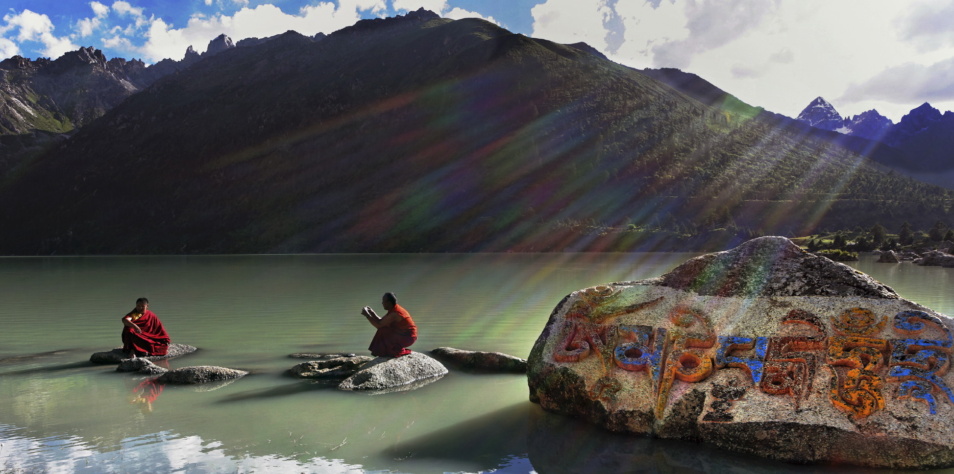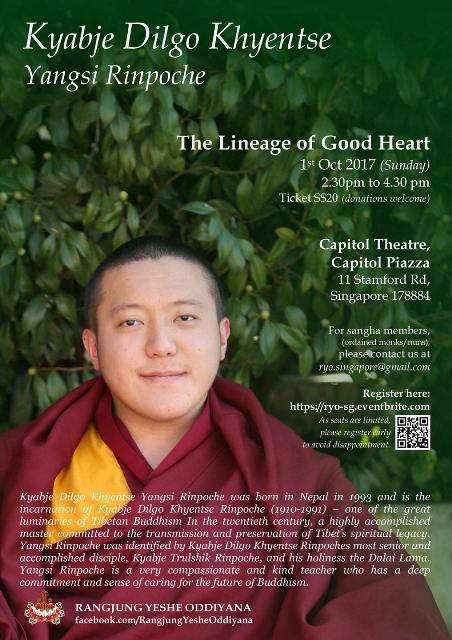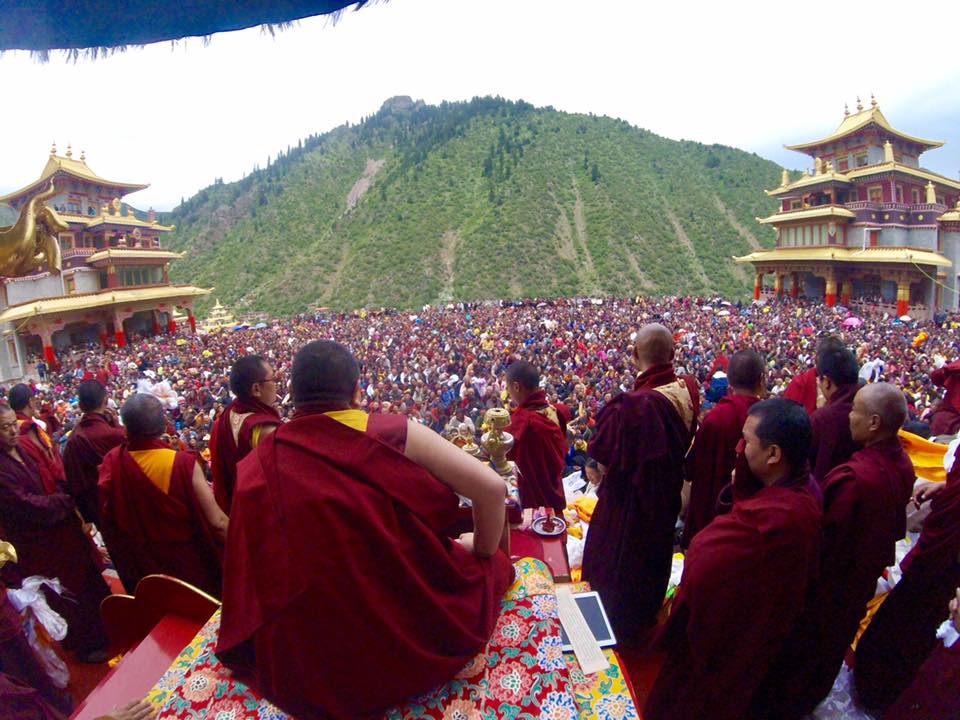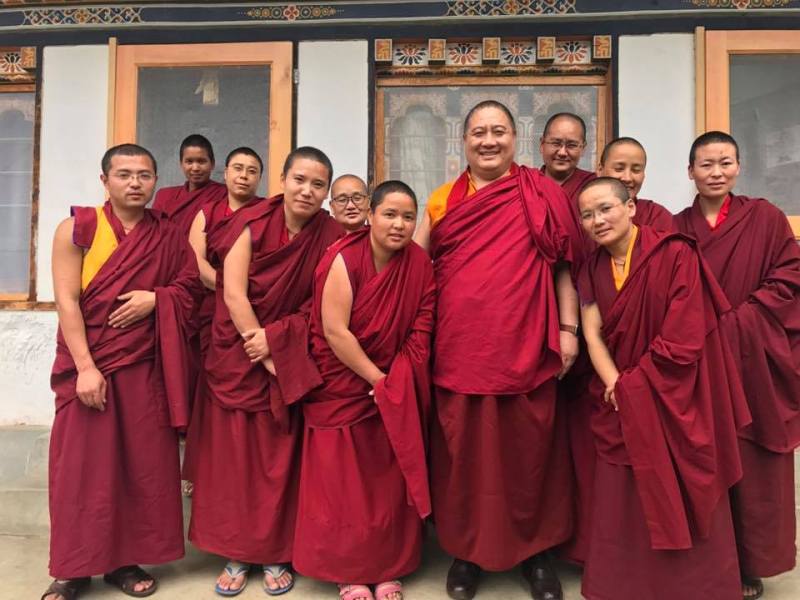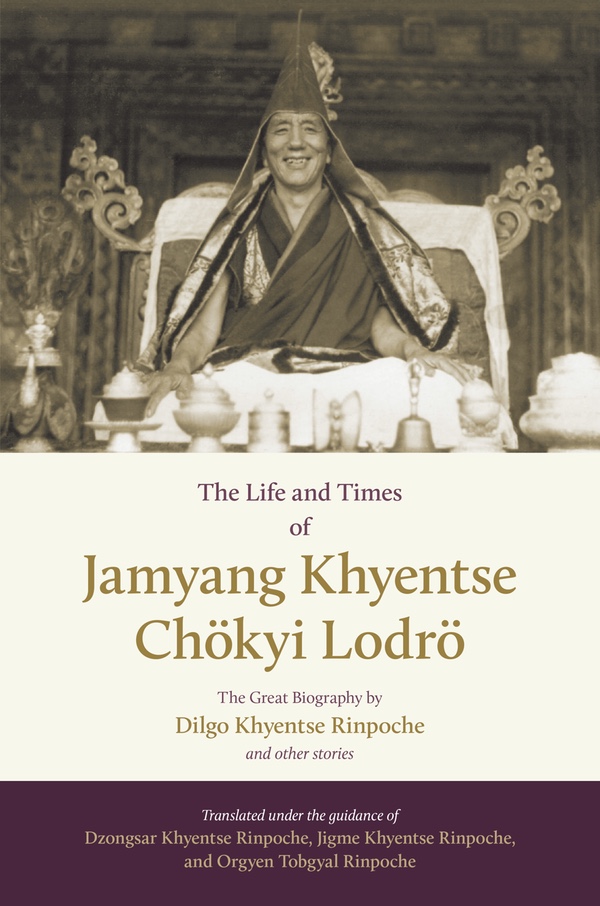#20 August 2017 Newsletter
Quick links in this edition:
Dilgo Khyentse Yangsi Rinpoche Teaching Schedule Oct-Nov 2017
Shechen Rabjam Rinpoche Visits Tibet
Shechen Shedra’s New Research Unit
Shechen School Upgrades
Shechen Nuns On the Move
New Translation: The Life and Times of Jamyang Khyentse Chokyi Lodro
Enlightened Vagabond: A New Book by Matthieu Ricard
Other Links
Dilgo Khyentse Yangsi Rinpoche Teaching Schedule Oct-Nov 2017
We are delighted to announce that Khyentse Yangsi Rinpoche will be teaching in Singapore, Australia, Malaysia, Hong Kong and Mexico in October and November this year.
Please download the schedule and contact details for how to register for any of these teachings.
Shechen Rabjam Rinpoche Visits Tibet
Kyabje Shechen Rabjam Rinpoche visited Shechen Tibet from August 1-12 for the first time since its auspicious inauguration in July 2016, which he had sadly been unable to attend. During this historic visit Rinpoche bestowed empowerments to over 6,000 lay people and 5,000 monastics. On the morning of the last day of his tour he bestowed Kyabje Dilgo Khyentse Rinpoche’s Guru Yoga Empowerment to more than 2000 people (Khenpos, Tulkus, Lamas, monks and Nagpas) and in the evening 12,000 people came from more than six different districts to receive teachings and take part in a Long Life empowerment.
Shechen Shedra’s New Research Unit
Shechen has joined an exciting and groundbreaking collaboration between Western academia and traditional Buddhist philosophical and textual studies, instigated by the Khyentse Center for Tibetan Buddhist Textual Scholarship (KC-TBTS). KC-TBTS was established in January 2011 by Prof. Dorji Wangchuk from the Department of Indian and Tibetan Studies, Asia-Africa Institute, University of Hamburg, Germany, with the help of a grant from the Khyentse Foundation.
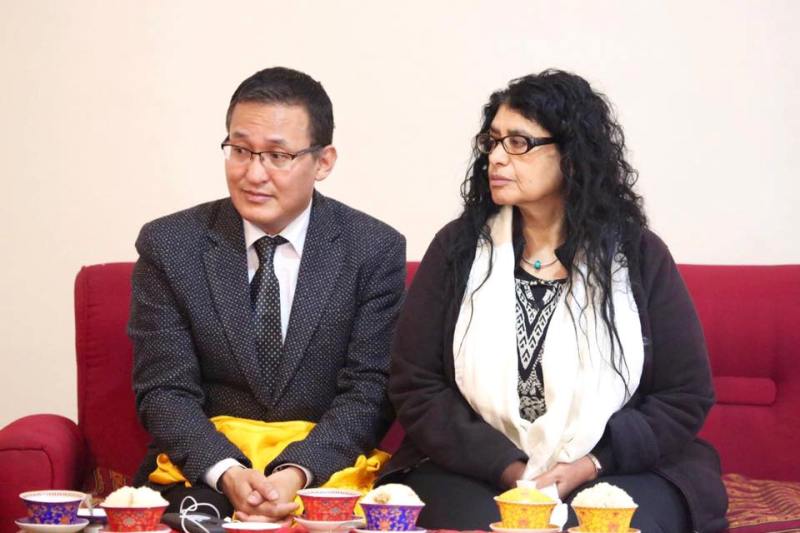
Professor Wangchuk and Dr Orna Almogi have been conducting workshops to foster research activities in the Himalayan Buddhist monastic seminaries using Western academic tools and standards, to develop collaborative research projects between monastic research centers and the Western academia. The Center is devoted to scholarly investigation of Tibetan (primarily Buddhist) texts, the aim includes gaining a more accurate understanding of Tibetan Buddhist philosophy, Tibet’s rich intellectual history, Tibetan textual culture, scholarly editing of Tibetan texts, and so on.

From March 06–26, 2017, Shechen Nepal hosted KC-TBYS’s sixth workshop, named “Tibetan Buddhist Textual Scholarship: Means and Methods of Research (Level 2)”, led by Professor Wangchuk and Dr Orna Almogi. The workshop included participants from several monastic seminaries and research centres from South Asia, including Dzongsar Institute Research Center (Chauntra), Ngagyur Nyingma Research Institute (Mysore), and Shechen Research Unit, alongside several individuals from other institutions.
This is the second such workshop that the group of graduates from Shechen’s Philosophical College have joined, who now form a team within the monastery known as “Shechen Research Unit” dedicated to continuing this groundbreaking style of research and critical editing. The team consists of five graduates: Tulku Urgyen Dorje, Lopon Choying Rangdrol, Lopon Rupchandra, Lopon Ngawang Tenzin, and Lopon Ngawang Gyamtso.
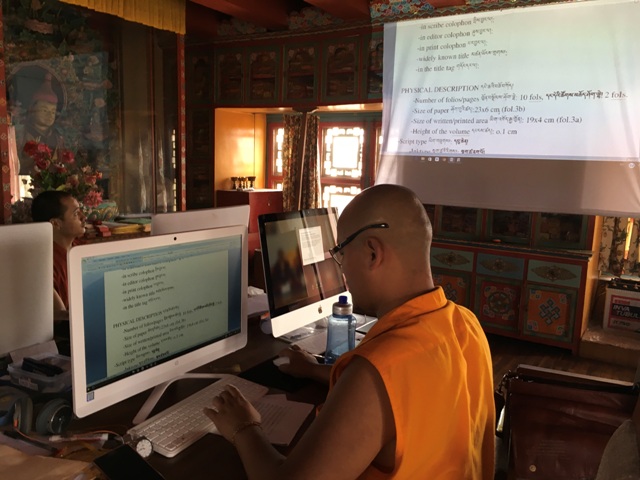 The participants acknowledged to Shechen Enews that learning the meticulous methods of Western academic research was very difficult in the beginning. Some had to first learn basic computer skills, and it was difficult for those with minimal English language skills to learn the tools and techniques to create their critical editions, which are all in English.
The participants acknowledged to Shechen Enews that learning the meticulous methods of Western academic research was very difficult in the beginning. Some had to first learn basic computer skills, and it was difficult for those with minimal English language skills to learn the tools and techniques to create their critical editions, which are all in English.
Philology involves painstaking research; all the variant editions of a particular text are first sourced and then compared word by word for differences. Those differences are labelled using academic tools, and then analysed and some kind of hypothesis or conclusion drawn from that. The historical context is also researched and any other material that may be relevant.
… Our traditional methods have not validated the texts in this way, so I think it is very important work that will be helpful for our tradition.
–Tulku Urgyen Dorje
Some of the participants were initially concerned that the methods would somehow undermine their traditions, but soon saw that there was no conflict at all between the modern academic approach and the traditional approach. A number of the participants expressed that they felt it was a very important collaboration that would be beneficial to Buddhist scholarship.
Professor Dorji Wangchuk said:
… I would say that the purpose is … [not], We are doing this so that the Buddhist teachings will be secured or protected’ so this is not the immediate goal of an academic, but—and this is a big ‘but’, and now I am speaking as someone who comes a bit from the tradition—I personally believe that the future of Buddhism really lies in a nuanced, critical and differentiated understanding of Buddhism… Because I think proper academic study should not be biased at all. … My argument is that this is also in conformity with the tradition, because you do not take away what is there, nor do you add to what is there. It is without depreciation or exaggeration. So it is about seeing things as they are. This idea is by the way, not just Buddhist, but is an Indian traditional way of thinking … [which is] also in conformity with academia.
Shechen Enews would like to thank Professor Dorje Wangchuk, Dr. Orna Almogi, Atsuki Nakagami (84,000) and the participants from Dzongsar College, Ngagyur Nyingma Institute and Shechen Research Unit.
Shechen School Upgrades
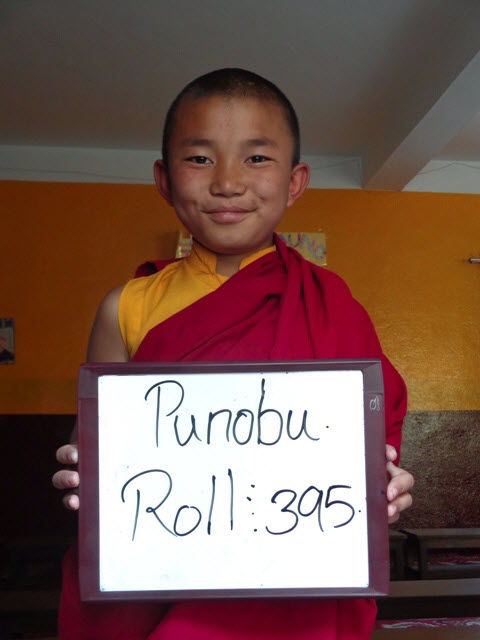
The Nepali government has approved the Shechen School’s request to upgrade its classes to include Class 7. This is good news as it helps us to progress toward the goal of expanding through Class 12, the equivalent of a high school diploma.
The main obstacle we now face is lack of space; as we add more classes, we need more classroom and living space. The monastery compound is already overcrowded. Several solutions are in consideration, such as renting additional classrooms offsite and bussing the children to classes, buying land to build classrooms and/or a hostel, and rebuilding the dining room structure to accommodate classrooms.
Monastic sacred arts (music, sacred dance or cham, and torma-making) are now being taught to students in Class 7, a further step in integrating monastic studies into the curriculum.
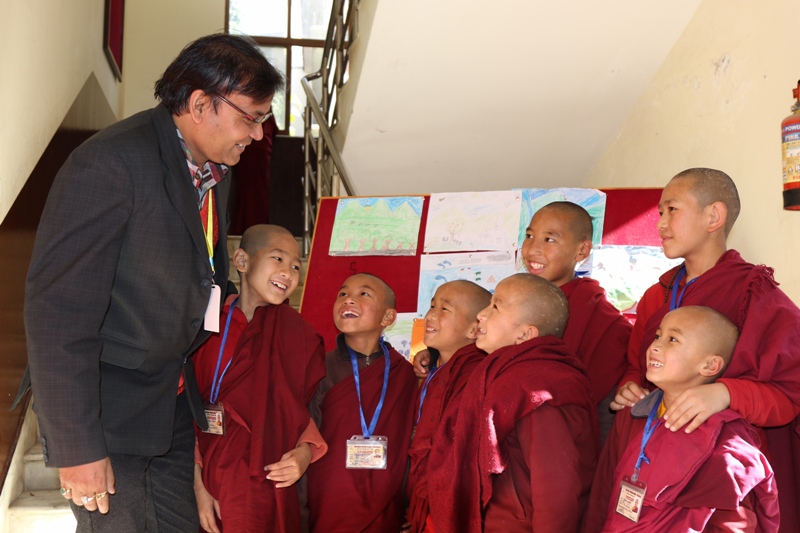
Last year our principal, Jhabindra Kumar Subedi, created the Buddhist Monastic School Association. It meets regularly and is a forum for other schools, with similar integrated monastic and secular studies, to discuss issues and work with the government. The Shechen School is leading this initiative and recently hosted a successful inter-Buddhist school quiz.
Please follow the activities of the school on Facebook where you can learn more about our activities
Donor News: In addition to funding the computer study lab, Altruistic Odyssey will create a new lending library for the school. If you would like to donate photo and picture books to the library, please let us know.
Donations to support the school or sponsor a young monk are always greatly appreciated and are paramount to keeping the school operating.
Shechen Nuns On the Move
Rabjam Rinpoche is especially proud of the progress of the Shechen nuns in Bhutan. Annually, they conduct more than 4 drupchens and druphos, nyugneys (fasting retreats), and a yarne (summer rain retreat).
In addition, they perform traditional sacred dances in full costume in selected ceremonies. It is unusual for a nunnery in Bhutan to be able to perform this many activities, and is a credit to their dedication and diligence.
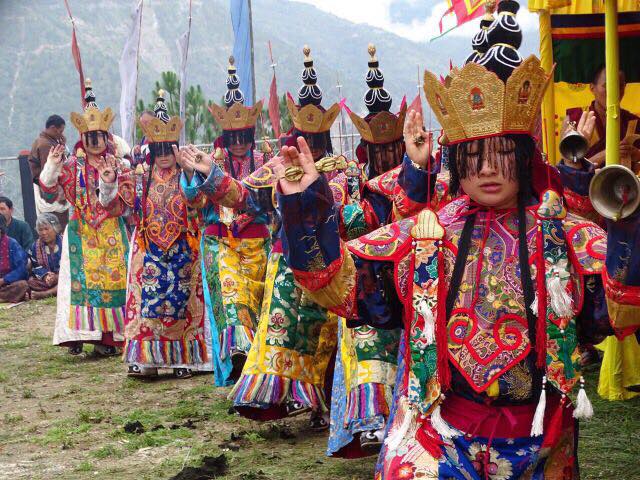 This spring, Rinpoche gave instructions and teachings to six nuns in preparation for their three-year retreat at the Shechen Orgyen Chozong retreat center. This is the fourth group of nuns to enter retreat. One of them, Tsering Yangdon, was our translator and contact for the nunnery for many years. We wish them the best on their inner journey.
This spring, Rinpoche gave instructions and teachings to six nuns in preparation for their three-year retreat at the Shechen Orgyen Chozong retreat center. This is the fourth group of nuns to enter retreat. One of them, Tsering Yangdon, was our translator and contact for the nunnery for many years. We wish them the best on their inner journey.
Please help support a Shechen nun by becoming a recurring sponsor.
Thank you!
New Translation: The Life and Times of Jamyang Khyentse Chokyi Lodro
The Life and Times of Jamyang Khyentse Chökyi Lodrö is an exciting new translation of Dilgo Khyentse Rinpoche’s biography of his root teacher, and also includes stories collected by Orgyen Tobgyal. It was translated under the guidance of the eminent teachers Dzongsar Khyentse Rinpoche, Jigme Khyentse Rinpoche and Orgyen Tobgyal Rinpoche.
The foremost torchbearer of the Rime movement, Jamyang Khyentse Chökyi Lodrö (1893–1959) dedicated his life to the study, practice, and propagation of all the schools and lineages that are collectively known as Tibetan Buddhism.
The first half of this volume presents informal stories by many of Chökyi Lodrö’s teachers, students, friends, and relatives, collected by Orgyen Tobgyal Rinpoche. Intimate, funny, and utterly down-to-earth, these stories—supplemented by sixty-one photographs—introduce readers to the characters and events in his life, and especially the challenges he faced because of the Chinese occupation of Tibet.
The second half comprises an English translation of the spiritual biography, or namtar, by Dilgo Khyentse Rinpoche, one of Chökyi Lodrö’s closest and most brilliant students. In the process of recounting the life and liberation of his beloved guru, Dilgo Khyentse provides, essentially, a blueprint of the entire path to enlightenment.
You can find this book here: http://www.shambhala.com/the-life-of-jamyang-khyentse-chokyi-lodro.html
Enlightened Vagabond: A New Book by Matthieu Ricard
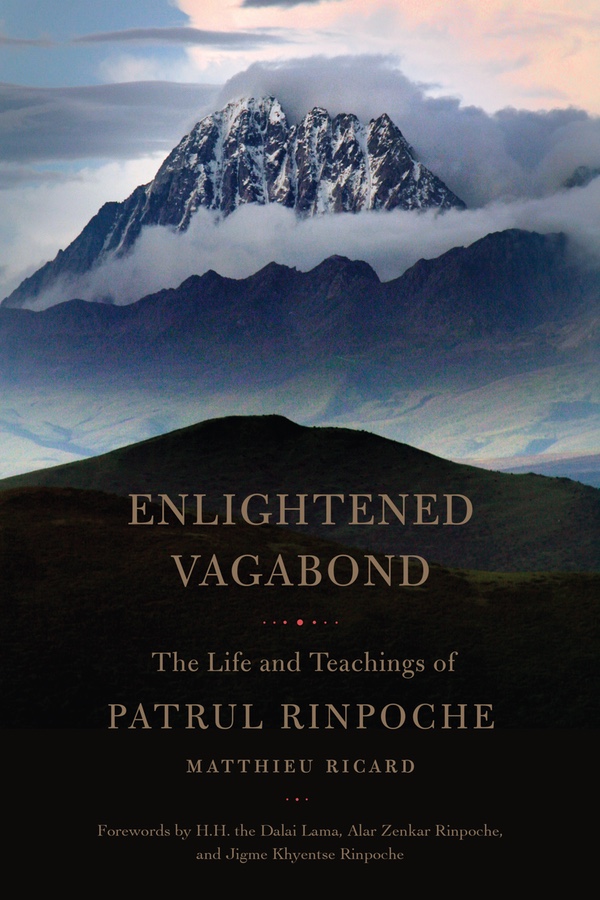
Enlightened Vagabond: The Life and Teachings of Patrul Rinpoche is a vivid and inspiring account of the life of Dza Patrul Rinpoche (author of The Words of my Perfect Teacher among other works). These stories have been passed down orally from teachers to students since the late nineteenth century.
Over the past thirty years, Matthieu Ricard has been collecting them from the last generation of masters whose teachers actually met Patrul Rinpoche. They reveal the nature of a highly realized being as he transmits the Dharma in everything he does, teaching both simple nomads and great lamas in ways that are often unconventional and even humorous, but always with uncompromising authenticity.
This collection will give you a new appreciation of the vast activity of this great master, and most of all inspire you to practice.
“Enlightened Vagabond enshrines fascinating life stories of the great Patrul, a celebrated scholar and adept roaring in the silent caves of Tibet’s high mountains with the sounds of definitive wisdom and unconditional love that can now reverberate in the hearts of all readers, lay and adept, thanks to this precious book.”
—Tulku Thondup Rinpoche, author of Masters of Meditation and Miracles.
You can find this book here: http://www.shambhala.com/patrul-rinpoche.html
Other Links
For continuing news please regularly visit our website where you can sponsor a monk or nun, donate to one of our projects, request prayers and find new information and photos. Current photos and news can also be found on our Facebook page.
